On Feb. 16, 1992, a decade into the Israeli occupation of south Lebanon, Israel assassinated Abbas al-Musawi, Hezbollah’s co-founder and Secretary-General. At the time, Israeli media praised the army’s decisive action, predicting that “the age of tussling with Hezbollah on its home turf, the Buffer Zone, is over,” and that al-Musawi’s death would mark the beginning of “a new era.”
Such predictions were proven hollow: al-Musawi was replaced by Hassan Nasrallah, a much more effective and charismatic leader, and Hezbollah grew so powerful that they successfully forced the Israelis out of south Lebanon by 2000.
Over three decades after al-Musawi’s assassination, Israel killed his successor. Like countless others in Lebanon and beyond, I was in shock. Nasrallah was, after all, a political figure who has been around my entire life. His story embodied so much of postwar Lebanon — its contradictions, trauma, violence, and impunity, but also its moments of defiance and possibility.
Nasrallah’s death also came at a time of unprecedented domestic weakness for Hezbollah, due to its unpopular involvement in the Syrian civil war and its violent politics in Lebanon. In this sense, Netanyahu’s decision to assassinate Nasrallah — turning him into a national and pan-Arab martyr — may prove to be Hezbollah’s greatest PR win in years.
Nasrallah was no ‘head of the snake’
“Hassan Nasrallah will no longer be able to terrorize the world,” the Israeli army announced shortly after his death. IDF spokesman Doron Spielman praised the assassination as eliminating “the Diabolical head of the Hezbollah snake,” a metaphor frequently used across Israeli media.
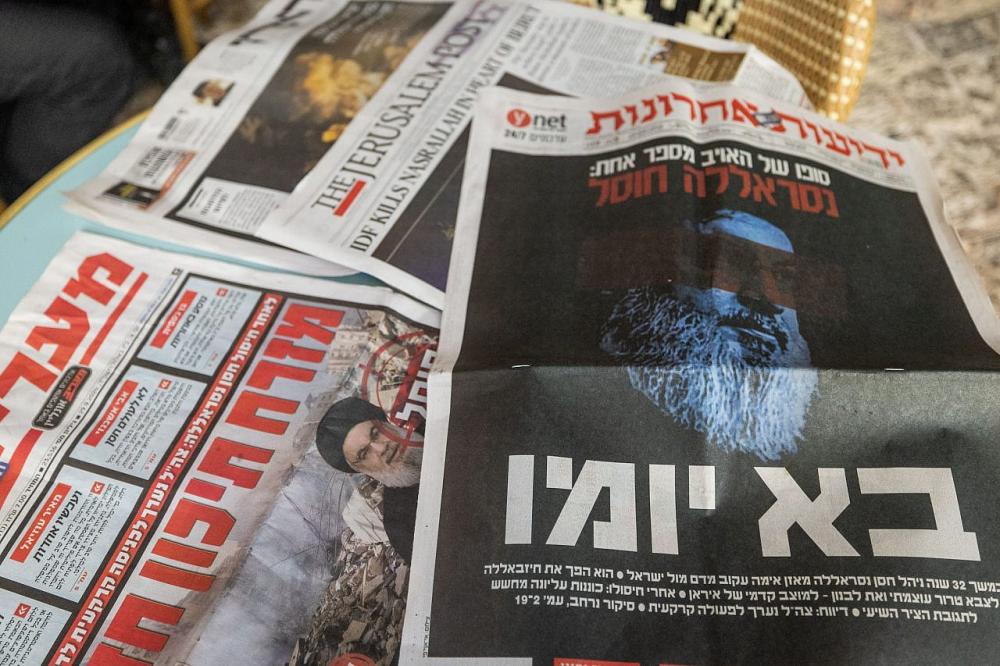
Israeli newspaper headlines at a coffee shop in Jerusalem on September 29, 2024, two days after Israel’s assassination of Hezbollah leader Hassan Nasrallah in Beirut. (Yonatan Sindel/Flash90)
It is astonishing to see how consistently Israeli leaders have adhered to this logic, despite being proven consistently wrong for decades. As one 1992 article in Maariv argued after the killing of al-Musawi: “Cutting off the head of the snake has long been considered the most efficient way of countering terrorism … if the message of deterrence is received, and if Israel doesn’t relent, there’s a good chance of stopping the spread of this cancer for the long run.” Such metaphors are a convenient way to avoid dealing with the reality of resistance movements.
Israel’s strategy of assassinating Hezbollah leaders is based on two assumptions: that the party wholly depends on its hierarchy to function — and thus becomes debilitated without Nasrallah — and that killing them serves as effective deterrence.
Hezbollah does indeed have a hierarchy, and there is no doubt that targeting high-ranking members is a blow to the group. In what ended up being his last speech, Nasrallah even admitted that the detonation of pagers and walkie-talkies distributed to Hezbollah members were the result of an intelligence failure.
And yet, Hezbollah’s rockets have not stopped since Nasrallah’s death. In fact, they have reached further into Israel than ever before, as far as Tel Aviv and other central Israeli towns.
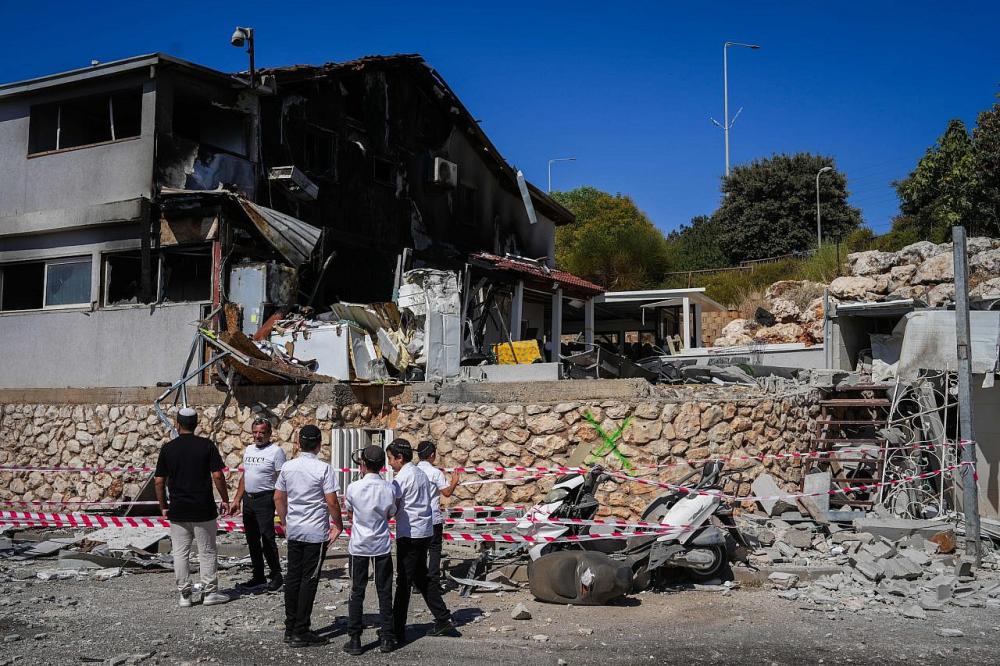
View of a house that was hit from a missile fired from Lebanon overnight, in the northern Israeli city of Tzfat, September 28, 2024. (Ayal Margolin/Flash90)
Moreover, Nasrallah himself repeatedly made reference to his impending assassination — and in some ways, he may have longed for it. A recently resurfaced interview from the early 1990s shows Nasrallah describing martyrdom as akin to going “into a quiet, comfortable room” in which one finds that “a cocktail is waiting for you, and you get to hear beautiful classical music.”
For a man who has lived most of the past two decades in underground bunkers and tunnels, martyrdom was something he believed would honor his struggle on Earth. And at a moment of growing political crisis for Hezbollah, Nasrallah’s death may have turned him into more of a rallying symbol than anything he could have ever been in life.
A mixed legacy for the ‘leader of the resistance’
Under Nasrallah, Hezbollah had both ups and downs. The liberation of south Lebanon in 2000, and the “divine victory” that ended the 2006 war, enabled the party to cultivate its reputation as the most powerful “resistance” to Israeli aggression.
Yet other policies made Hezbollah deeply unpopular. In Syria, Nasrallah’s decision to militarily intervene to prop up the regime of Bashar al-Assad remains highly controversial, given both the history of Syria’s own occupation of the country until 2005, and the regime’s brutal violence against Syrian protesters and civilians since the 2011 revolution.
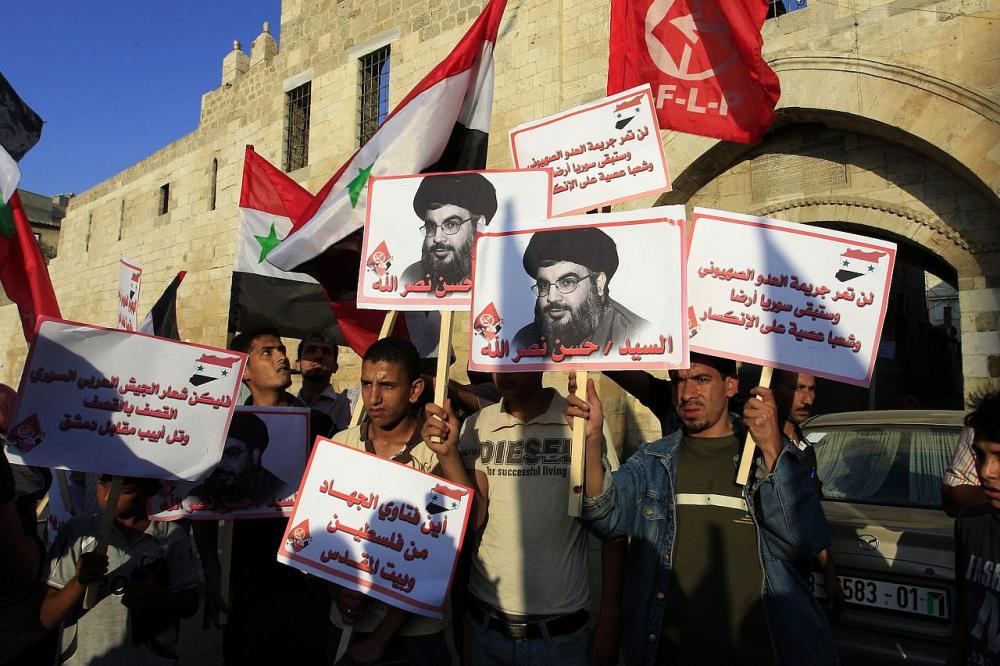
Palestinian supporters of the Popular Front for the Liberation of Palestine (PLFP) wave the group’s red flag, the Syrian flag, and the Palestinian flag as they holds poster of Hezbollah leader Hassan Nasrallah, during a rally on May 7,2013. (Abed Rahim Khatib/Flash90)
In Lebanon itself, Hezbollah became the primary backer of a corrupt sectarian status quo that became the target of a Lebanese uprising in October 2019. The party and its Shia ally Amal decided to repress anti-government protesters, cementing Nasrallah’s reputation as the “covenant and protector of the thieves’ government,” to quote the late Lebanese writer Elias Khoury. Hezbollah’s assassination of the Dahiya-based Shia memory worker Lokman Slim in February 2021 was another reminder of the group’s willingness to kill those it deemed a threat.
Had Israel continued to weaken Hezbollah through its notorious Dahiya Doctrine, destroying both military and civilian infrastructure throughout south Lebanon, Nasrallah would have found himself in an increasingly precarious political situation: blamed for hiding away while so many civilians were being massacred. In a country where Hezbollah’s reputation was already at its lowest, this could have been a permanent blow to his role as the “leader of the resistance.”
But thanks to Netanyahu and his military leaders, Nasrallah died as he lived: opposing the Israeli war machine. We learned that Nasrallah was actually in Dahiya all along — in other words, that he never left the people he swore to defend. Until his death, he showed that he had managed to evade one of the world’s most sophisticated surveillance states for three decades, while living a mere 100 kilometers north of the Israeli border.
How many billions were spent just to track and kill this one man? The very possibility of his survival, it seems, was too terrifying for Israel to fathom. Nasrallah was apparently worth dropping 80 entire bombs and leveling entire buildings filled with civilians in order to kill, a method of assassination that shocked many in Lebanon and around the world. The destruction was apocalyptic, a scene already familiar to Beirutis who survived the August 4 port explosion. We will never know exactly how many people were killed — many were pulverized out of existence — but according to Hezbollah, Nasrallah’s body remained relatively intact, dying from “blunt trauma from the force of the blast.”
What Netanyahu did was not cut off “the head of the snake.” He elevated the leader of a movement that believes in predestination, that the future is already written by God. Following this logic, Netanyahu himself is now a central character in Nasrallah’s story.
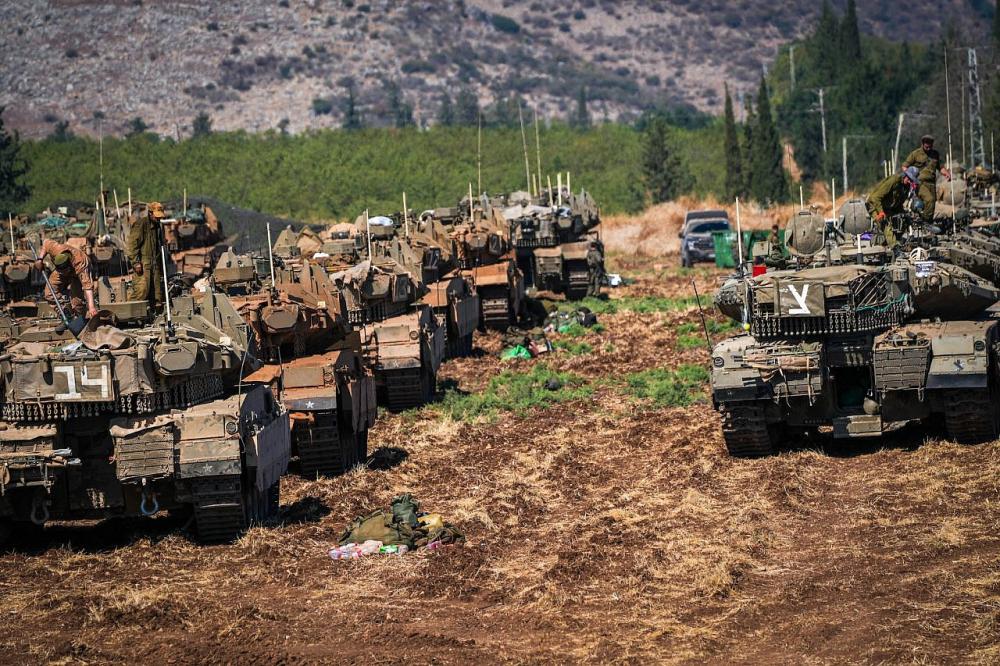
Israeli soldiers seen at a staging area near the Israeli border with Lebanon, September 27, 2024. (Ayal Margolin/Flash90)
It is also telling how much Hezbollah became so important in the Israeli psyche, that the IDF even named one of its most notorious doctrines after the neighborhood from which it is headquartered. Nasrallah was living rent-free in the Israeli mind, and he will continue haunting them for years.
Escalation through escalation
Among the plethora of articles in 1992 praising the assassination of al-Musawi, one made a relatively sober admission. “We don’t believe this will do anything to advance the return of captive and missing ,” the author argued, in reference to the Israeli soldiers kidnapped by Hezbollah at the time. Over a year later, another article noted that “Hezbollah activity is predicted to escalate further,” but quoted a military analyst urging Israel “to hit them harder.”
Israel’s military and political establishment seems once more convinced that defeating Hezbollah requires bombing Lebanon indiscriminately. At the time of writing, the IDF has already suffered its first casualties in its ground invasion. For months, Netanyahu has been itching to drag Hezbollah and Iran into an all-out war, and by killing Nasrallah and provoking a barrage of Iranian missiles, he may finally get what he wants.
In the meantime, Hezbollah has yet to name Nasrallah’s successor — although according to Naim Qassem, the group’s deputy leader, a decision will be reached imminently. Hashem Safieddine, Nasrallah’s cousin who is also the head of the party’s executive council and a member of its military council, is the likeliest candidate, and some analysts have already declared him to be “even more hardline” than Nasrallah.
Like the Israeli military commentators in the 1990s, both the Netanyahu and Biden administrations have subscribed to the delusional, Orwellian notion of “de-escalation through escalation.” Washington, according to one political expert, is “thrumming with ‘birth pangs of a new Middle East’ energy,” as top White House officials see Israel’s war against Hezbollah as a “a history-defining moment” that will reshape the entire region.
That we have reached this stage yet again only reveals how those with the bigger bombs remain profoundly disconnected from reality — with disastrous consequences for civilians across the region.
Elia Ayoub is a post-doctoral researcher and writer. He is the founder of The Fire These Times podcast and co-founder of From the Periphery media collective. He holds a PhD in Cultural Analysis on postwar Lebanon and runs a newsletter on the region called Hauntologies. He can be found on Bluesky, Mastodon and Instagram and his work is archived at iwritestuff.blog.
Support journalism against apartheid. Become a member of +972 Magazine
We rely on YOUR contribution to expose and resist injustice in Israel-Palestine
+972 Magazine is an independent, nonprofit media organization of Israeli and Palestinian journalists that relies on the support of readers like you.
Through our groundbreaking reporting on the ground and critical analysis, we spotlight the people and communities working to oppose occupation and apartheid, and promote justice and equality for all those living between the river and the sea.
In order to foster real and meaningful change, we have to be able to do this work in the long run. That means paying our Palestinian and Israeli journalists, as well as providing them with the necessary legal protections as they report from the frontlines. We have to ensure that we keep reaching millions of people around the world — from policymakers to grassroots activists to regular readers — with the reliable information they need. We remain committed to allowing people access to this information with no paywalls or ads. To do all that, we need your support.
By becoming a member with a monthly contribution of any size (which you can cancel at any time), you will allow us to sustain this work and reach millions of new readers. We know how to change the conversation on Israel-Palestine. Will you help us to make that happen?
What do I get if I become a member?
A quarterly newsletter featuring a behind-the-scenes look into +972 Magazine’s editorial process.
Exclusive, free-of-charge online workshops and exclusive access to +972 events.
The opportunity to engage with +972’s editors and writers through Q&As and online webinars, and offer feedback to help shape our coverage.
Where does the money go?
All contributions to +972 Magazine are put directly toward operating the site and producing journalism. Our expenses include salaries for a small team of editors and writers, payments for freelance contributors, website maintenance, legal counsel, management, and other administrative costs.
All contributions go through “972 – Advancement of Citizen Journalism,” a registered nonprofit established in order to support and manage our project. Learn more about the nonprofit by visiting the website.
+972 Magazine receives support from readers, foundations and individual donors. To learn more about how we are funded, click here.
Is my donation tax deductible?
If you’re in the United States, United Kingdom, Switzerland, or Germany, your donation can be tax deductible. In the U.S. and U.K. — please follow instructions within the donation process. If you are a Swiss or German citizen or resident, please contact us at donations@972citizenjournalism.org for further instructions.

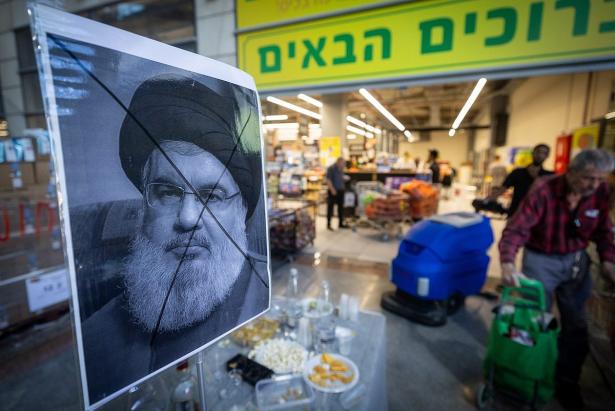
Spread the word